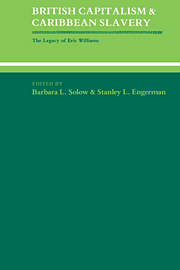Book contents
- Frontmatter
- Contents
- List of Contributors
- Preface
- British Capitalism and Caribbean Slavery: The Legacy of Eric Williams: An Introduction
- Part I Slavery as an Economic Phenomenon
- Part II Caribbean Slavery and the Industrial Revolution
- Part III The Decline of the British West Indies
- Part IV The Basis of Abolition and Emancipation
- Paradigms Tossed: Capitalism and the Political Sources of Abolition
- Capitalism, Abolitionism, and Hegemony
- Eric Williams and Abolition: The Birth of a New Orthodoxy
- What and Who to Whom and What: The Significance of Slave Resistance
- Part V Capitalism and Slavery in Historical Perspective
Eric Williams and Abolition: The Birth of a New Orthodoxy
Published online by Cambridge University Press: 15 December 2009
- Frontmatter
- Contents
- List of Contributors
- Preface
- British Capitalism and Caribbean Slavery: The Legacy of Eric Williams: An Introduction
- Part I Slavery as an Economic Phenomenon
- Part II Caribbean Slavery and the Industrial Revolution
- Part III The Decline of the British West Indies
- Part IV The Basis of Abolition and Emancipation
- Paradigms Tossed: Capitalism and the Political Sources of Abolition
- Capitalism, Abolitionism, and Hegemony
- Eric Williams and Abolition: The Birth of a New Orthodoxy
- What and Who to Whom and What: The Significance of Slave Resistance
- Part V Capitalism and Slavery in Historical Perspective
Summary
When, on August 1, 1984, Prime Minister Forbes Burnham told a rally of 5,000 people in Georgetown, Guyana, that Britain did not abolish slavery in 1834 for humanitarian reasons but because the system had become “unprofitable, risky and expensive” it is unlikely that it came as news to most members of his audience. Certainly no surprise was registered when Mrs. Marilyn Gordon, Minister of Sports, Culture, and Youth Affairs, addressed similar remarks to a gathering at the Institute of International Relations of the University of the West Indies at St. Augustine, Trinidad, two days earlier. However revolutionary such comments may have seemed in Oxford, or indeed elsewhere, in the 1930's or 1940's, they were, so Elsa Goveia tells us, “already orthodox at the UCWI in the 1950's” and were penetrating large numbers of schools all over the West Indies.
Professor Goveia was, of course, referring specifically to the views of Eric Williams. As a politician, Williams, one suspects, would not have been displeased at the frequency with which his ideas were cited in connection with the 150th anniversary of the abolition of slavery in the West Indies, although whether, as a scholar, he would have approved of all that was said in this regard we can be less sure.
- Type
- Chapter
- Information
- British Capitalism and Caribbean SlaveryThe Legacy of Eric Williams, pp. 229 - 258Publisher: Cambridge University PressPrint publication year: 1988
- 1
- Cited by

